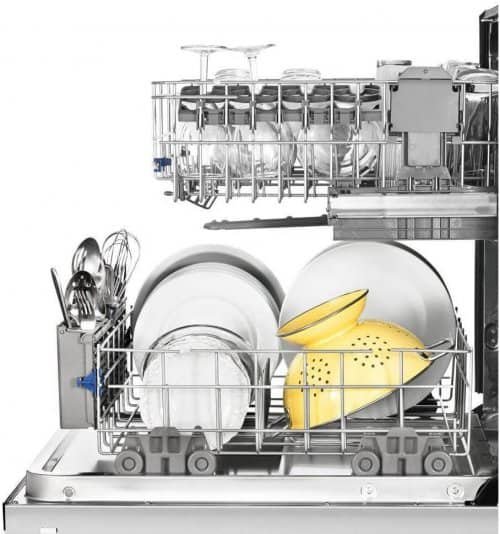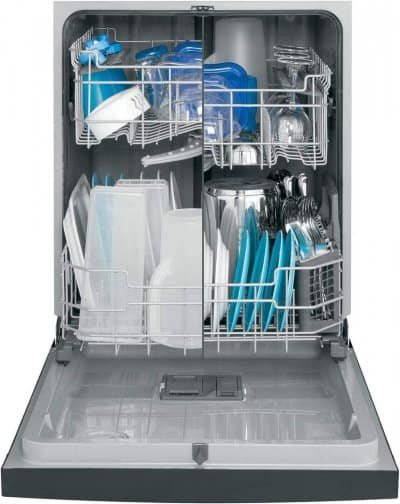Did you ever wonder how much water your dishwasher consumes during a typical cycle? Dishwashers are essential appliances in modern kitchens, providing convenience and efficiency in cleaning our dishes. Understanding the water usage of dishwashers can help us make informed choices about our water consumption and contribute to a more sustainable lifestyle. In this article, we will explore the factors influencing water usage, average water consumption, and tips for reducing water usage in dishwashers.
Dishwashers have revolutionized the way we clean our dishes. Gone are the days of manually scrubbing plates and cutlery for hours. With the advancement of technology, dishwashers have become more efficient, using less water and energy while still achieving excellent cleaning results. However, it’s crucial to understand the water consumption of dishwashers to ensure we are using this appliance responsibly.
Table of Contents
How Does a Dishwasher Work?
Before diving into water usage, let’s briefly understand how dishwashers work. Dishwashers have a compartment where you load your dirty dishes. Once the dishwasher cycle starts, water is sprayed onto the dishes using jets. The detergent breaks down food particles, and the water rinses them away. The water is then drained, and a heating element dries the dishes. This process ensures your dishes come out sparkling clean without the need for manual scrubbing.
Water Consumption in Dishwashers
Water consumption is a significant concern for every household, and one of the most water-intensive activities in any kitchen is washing dishes. Dishwashers use a considerable amount of water and energy to clean dirty plates, glasses, pots, and pans. In recent years, there has been growing awareness about the impact of water usage on the environment and our wallets.
As more people become conscious of their daily habits’ environmental impact, it’s worth looking at how much water dishwashers consume compared to handwashing. This article will explore the typical water consumption patterns among different dishwasher models and how you can optimize your appliance’s performance to save both energy and money.

Factors Affecting Water Usage
Several factors influence the amount of water a dishwasher uses. The main factors include the dishwasher’s age, size, energy efficiency, and the cycle selected. Older models generally use more water than newer, energy-efficient models. Additionally, larger dishwashers tend to consume more water since they have a greater capacity to accommodate more dishes.
The cycle chosen also affects water consumption. For example, the “light” or “quick” cycle uses less water than the “heavy-duty” or “pots and pans” cycle. It’s essential to select the appropriate cycle based on the level of dirtiness and the type of dishes you are cleaning.
Average Water Usage
On average, traditional dishwashers consume around 4-6 gallons (15-23 liters) of water per cycle. However, it’s worth noting that water usage can vary depending on the factors mentioned earlier. Energy-efficient models, such as those with an ENERGY STAR label, are designed to use less water, typically around 3-4 gallons (11-15 liters) per cycle.
Water-Efficient Dishwashers
If you’re looking to reduce water usage even further, consider investing in a water-efficient dishwasher. These dishwashers are specifically designed to minimize water consumption while still delivering excellent cleaning performance. Look for models that have received recognition for water efficiency to ensure you’re making an environmentally friendly choice.
Tips for Reducing Water Usage
While the dishwasher itself plays a significant role in water consumption, there are steps you can take to further reduce water usage. By implementing these simple tips, you can make your dishwasher even more efficient and eco-friendly.
Scraping and Pre-Rinsing
Before loading your dishes into the dishwasher, make sure to scrape off excess food particles. Pre-rinsing dishes is not necessary, as modern dishwashers are designed to handle food residues. By avoiding pre-rinsing, you can save a substantial amount of water. However, for dishes with stubborn, dried-on food, a quick rinse may be required.
Optimal Dishwasher Load
To maximize water efficiency, load your dishwasher to its full capacity. Running the dishwasher when it’s only half full wastes water and energy. Be mindful of arranging dishes in a way that allows water to reach all surfaces for thorough cleaning. Utilize the dishwasher’s adjustable racks and loading options to accommodate different types of dishes.
Efficient Dishwashing Detergent
Choosing the right dishwasher detergent is crucial for both cleaning performance and water efficiency. Opt for high-quality, eco-friendly detergents specifically formulated for efficient dishwashing. These detergents not only require less water for rinsing but also minimize the negative impact on the environment.
Environmental Impact of Dishwashers
Understanding the water consumption of dishwashers is not only about personal water conservation but also about the larger environmental impact. By using water-efficient dishwashers and adopting water-saving practices, we can collectively reduce water consumption on a larger scale. Conserving water helps preserve this precious resource, minimizes strain on water sources, and reduces energy requirements for water treatment.
Can I pre-rinse my dishes to ensure better cleaning in the dishwasher?
While it’s not necessary, a quick rinse for dishes with stubborn food residues can help achieve better results.
Are energy-efficient dishwashers more expensive?
Energy-efficient dishwashers may have a higher upfront cost, but they can save you money in the long run through reduced water and energy consumption.
Do water-efficient dishwashers compromise on cleaning performance?
No, water-efficient dishwashers are designed to deliver excellent cleaning results while minimizing water usage.
Can I use any dishwasher detergent with a water-efficient dishwasher?
It’s recommended to use eco-friendly detergents specifically formulated for efficient dishwashing to maximize both cleaning performance and water efficiency.
How else can I contribute to water conservation in my kitchen?
Besides using water-efficient appliances, you can also fix any leaks, install aerators on faucets, and adopt mindful water usage habits to further conserve water.
Conclusion
In conclusion, the water usage of a dishwasher depends on various factors such as the model, cycle selected, and dishwasher efficiency. On average, dishwashers consume around 4-6 gallons of water per cycle, but energy-efficient models can use as little as 3-4 gallons. By following simple tips like scraping off excess food, optimizing dishwasher loads, and using efficient detergents, you can further reduce water consumption. Remember, saving water not only benefits the environment but also contributes to a more sustainable and responsible lifestyle.

